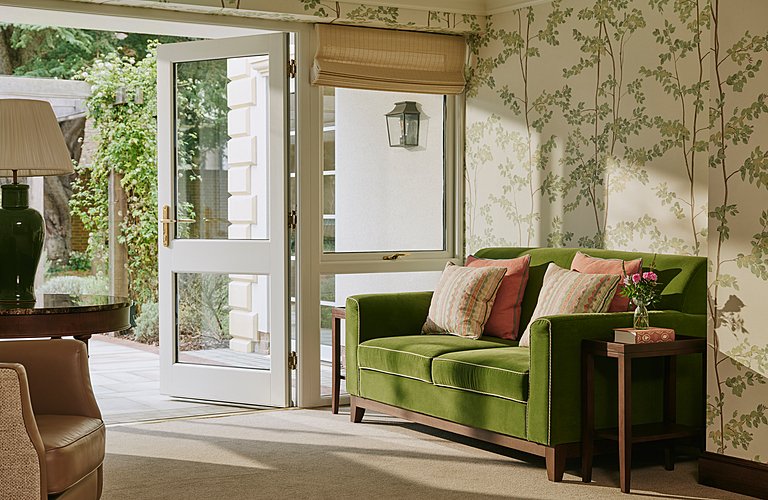192 Sloane Street, London SW1X 9QX

What Types of Care Homes Are There?
If you or your loved one no longer feel suited to independent living, you may be considering a care home. Care homes can present a reassuring and exciting opportunity to enjoy a new stage of life in a safe, supportive environment.
There are many types of care homes, each offering different facilities and levels of care for residents. Some provide assistance with basic tasks, while other homes can accommodate specialist medical needs.
In this guide, we’ll explore the most common types of care home in the UK and how they differ. We’ll discuss what you can expect from each residence to help you decide which is right for you.
What Is a Care Home?
A care home is a type of communal residence that offers care and accommodation for individuals with specific assessed care needs. Unlike sheltered housing, care homes are staffed with trained carers who are on-site round-the-clock. Each resident benefits from a personalised care plan based on their care and health needs.
Care homes can vary in size. The average home can accommodate 20 residents, while the largest have up to 250 rooms. Some UK care homes are operated by local authorities and charities. However, private care homes are more common.
What Are the Different Types of Care Homes?
There are three main types of care homes in the UK: residential care homes, nursing care homes and dual-registered care homes. They each specialise in different types of care and are suitable for people with varying needs and independence levels.
What Is a Residential Care Home?
Residential care homes for older persons generally offer long-term accommodation, day-to-day assistance and personal care. Some also provide short-term respite care and palliative care.
Sometimes simply called "care homes", residential homes are the next step up from care provided in a person’s own home. Each resident should have their own private bedroom, often with an en-suite bathroom. The living and dining areas of the home are usually communal.
Trained carers help residents with daily life and are on call for assistance 24 hours a day. A residential care home often provides:
- Support with self-care tasks such as bathing, dressing, mobilising and taking medication
- Home-cooked meals, snacks and beverages
- Laundry and housekeeping services
- On-site facilities such as gardens and recreation rooms
- Organised outings in the local community
- Meaningful activities and enrichment such as arts, educational and exercise programmes
Care home residents should always be supported to enjoy their independence and come and go as they please. However, specific measures may be agreed regarding a person’s safety due to their mental capacity. Friends and family should also be encouraged to visit and take part in activities.
Residential care home staff are required to undertake mandatory training, including how to safeguard residents and appropriately meet their care needs. However, they are not qualified nurses and do not generally provide medical care.
What Is a Nursing Home?
Nursing homes offer similar support, services and facilities to residential homes, but provide a higher level of care. This is because, as well as trained carers, qualified nurses are on-site 24 hours a day.
Nursing homes are designed for individuals with more complex medical needs that residential homes cannot provide for. For example:
- Progressive or terminal medical conditions
- Health conditions requiring more significant ongoing clinical input
- Conditions requiring multiple or advanced treatments
Residents may have to move from a care home into a nursing home as their care needs change. This could be a permanent transition, or for short-term accommodation. For example, someone who has had a stroke may require nursing care temporarily while they recover.
Some nursing homes specialise in providing tailored care for specific conditions, such as dementia or cancer. Others are more general, catering for a variety of medical needs.
What Is a Dual-Registered Care Home?
Like nursing homes, dual-registered care homes (such as KYN) have qualified nurses on-site permanently. However, dual-registered homes accept residents requiring basic residential care as well as those who need nursing care. They are sometimes called “care homes with nursing”.
There are several benefits of dual-registered care homes. Firstly, if a resident suddenly requires medical care, there is always a trained medical professional on hand. And if they develop a long-term medical issue, they will not usually need to move to a dedicated nursing home. This provides a sense of security and prevents the upheaval of transitioning to a new environment.
Some dual-registered care homes incorporate dedicated dementia care provisions. This may include care, environments, training and approaches specifically designed to support those living with the condition.
Discover KYN for Exquisite Residential and Nursing Care
At KYN, we take pride in enriching the lives of everyone who joins us. Our luxury care homes offer residential, respite, nursing and dementia care in beautiful, enabling and inspiring environments. We get to know each resident individually to truly embrace their personality, interests, hopes and inspirations.
Taking a holistic approach to physical and mental health, we provide exquisite care tailored to meet residents’ individual needs, preferences and lifestyle choices. Our residents also enjoy a comprehensive programme of social, entertainment and cultural activities alongside excellent hospitality and facilities.
To discover more about life at KYN, contact us today. Fill in our enquiry form, call us on +44 (0) 20 3535 1923 or email enquiries@kyn.co.uk.